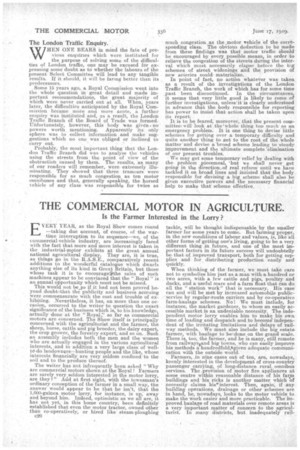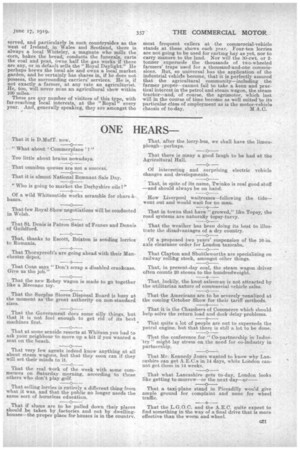THE COMMERCIAL MOTOR IN AGRICULTURE.
Page 2

Page 3

If you've noticed an error in this article please click here to report it so we can fix it.
Is the Farmer Interested in the Lorry ?
EVERY YEAR, as the Royal Show comes round —taking due account, of course, of the wartime interruption to its sequence—we, of the commercial-vehicle industry, are increasingly faced. with the fact that more and more interest is taken in. the industrial-motor exhibits at the great annual national agricultural display. They are, it is true, as things go in the R.A.S.E., comparatively recent additions to the wonderful catalogue %liar dwarfs anything else of its kind in Great Britain, but those whose task it is to encourage*the sales of such machines appear to be convinced that the " Royal " is an annual opportunity which must not be missed.
This would not be.p if it had not been proved beyond doubtsthat the publicity and business accruing were commensurate with the cost and trouble of exhibiting. Nevertheless, it has, on more than one occasion, occurred to the writer to question the exact significance of the business which is, to his knowledge, actually done at the "Royal' so far as commercial motors are concerned. The Show itself is principally concerned with the agriculturist and the farmer, the sheep, horse, cattle and pig breeder, the dairy expert, the crop grower, the forestry expert, and so on.. Such an assembly includes both the men and the women who are actually engaged in the various agricultural interests, .and in addition a very large class of welltd-do landowners—hunting people and the like, whose interests financially are very seldom confined to the soil and to the produce thereof.
The writer has not infrequently been asked " Why are commercial motors shown at the Royal? Farmers are surely very seldom interested in the motor lorry, are they 7" And at first sight, with the townsman's ordinary conception of the farmer in a small ;way, the answer would appear to be that he isn't,' that the 1,000-guinea motor lorry, for instance, is up, away and beyond him. Indeed, optimistic as we all are, it has not yet, in this home country, been definitely established that even the motor tractor, owned other than co-operatively, or hired like steam-ploughing c20 tackle, will be thought indispensable by the smaller farmer for some years to come. But farming proper, in the new conditions of labour and values is, like all other forms of getting one's living, going to be a very different thing in future, and one of the most important factors in its future success will undoubtelly be that of improved transport, both for getting supplies and for distributing production easily and quickly.
When thinking of the farmer, we must take care not to symbolize him just as a man with a hundred or two acres, with a few cattle and pigs, poultry and ducks, and a useful mare and a, farm float that can do all the "station work" that is necessary. His case can and will be Met by increased automobile publicservice by regular-route carriers and by co-operative farm-haulage schemes. No! We must include, for instance, the market gardener, to whom an easily accessible market is an undeniable necessity. The independent motor lorry enables him to make his own time of loading and despatch and to become' independent of the irritating limitations and delays of railway methods. We must also include the big estatefarmer, with haulage to benione on the grand scale. There is, too, the farmer, and he is many, still remote from railwaysfand big towns, who can easily improve his methods a hundredfold,igiven adequate communication with the outside world.
Farmers, in nine cases out of ten, are, nowadays, keenly interested in the development of cross-country passenger carrYing,. of long-distance rural omnibus services. The provision of motor fire appliances at some centre within reasonable distance of his farm buildings and his ricks is another matter which of necessity claims hieinterest Then, again' if any building operations, drainage or other schemes are in hand, be, nowadays, looks to the motor vehicle to make the work easier and more practicable. The improved haulage of road materials over remote areas is a very important matter of concern to the agriculturist. In many districts, but inadequately rail served, and particularly in such countrysides as the west of Ireland, in NNalee and Scotland, there is always a local Whiteley, a magnate who mills the corn, bakes the bread, conducts the funerals, carts the coal and peat, owns half the gas works if there are any, or in default sells the "Royal Daylight." He perhaps brews the local ale and owns a local market garden, and he certainly has shares in, if he does not possess, the surrounding carriers' services. He is if not exactly a. farmer, at any rate an agriculturist. He, too, will never miss an agricultural show within 100 miles.
There are any number of visitore of this type, with far-reaching kcal interests, at the "Royal" every year. And, generally speaking, they are amongst the most frequent callers at the commercial-vehicle stands at these shows each year. Four-ton lorries are not going to be used for carting hay as yet, nor to carry manure to the land. Nor will the 30-cwt. ot 2tonner supersede the thousands of two-wheeled farmers' traps used for a thousand-and-one commissions. But, so universal has the application of the industrial vehicle become, that it is perfectly assured that the agricultural community—including the farmer proper—cannot fail to take a keen and practical interest in the petrol and steam wagon, the steam tractor—and, of course, the agrimotor, which last will in the course of time become as well suited to its particular class of employment as is the motor-vehicle chassis of to-day. M.A.C.






























